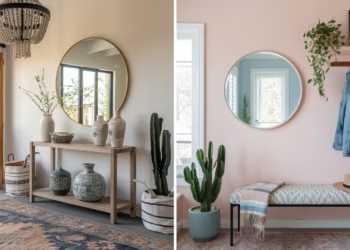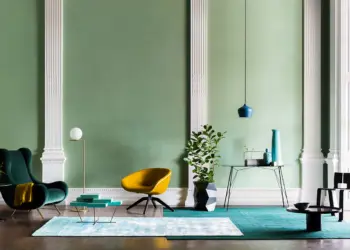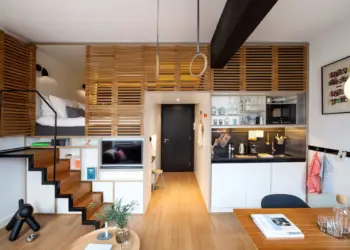Interior design mistakes may happen while picking the color of the ceiling. However, it’s important to take into account the overall impact you want to create in your room when selecting a ceiling color. Ceiling color may affect the space’s atmosphere, perception, and brightness.
This article will guide you through a lot of ceiling color choices and explain when using dark colors is suitable and when using light ones is preferable.
Table of Contents
The benefits of a colored ceiling
Create a bold statement with ceiling color
A colored ceiling can instantly capture attention and create a striking focal point in a room. It’s a bold way to express your personal style and add an artistic touch to your space.
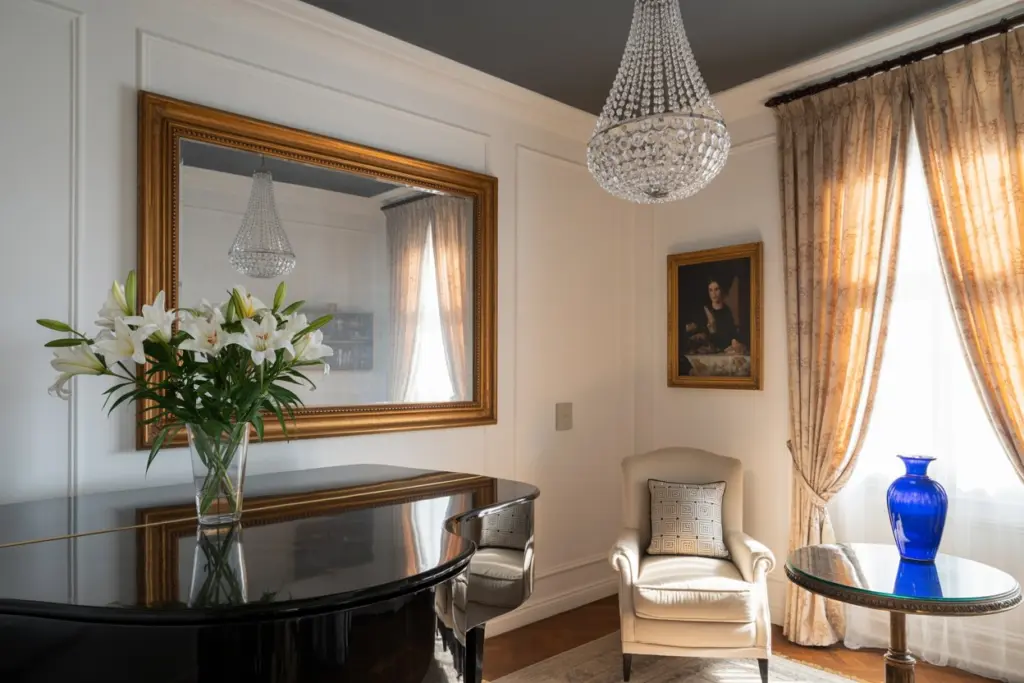
Accentuate architecture
If your ceiling has interesting architectural details such as beams, moldings or vaults, applying a bold color can highlight these unique features and create a striking visual effect.
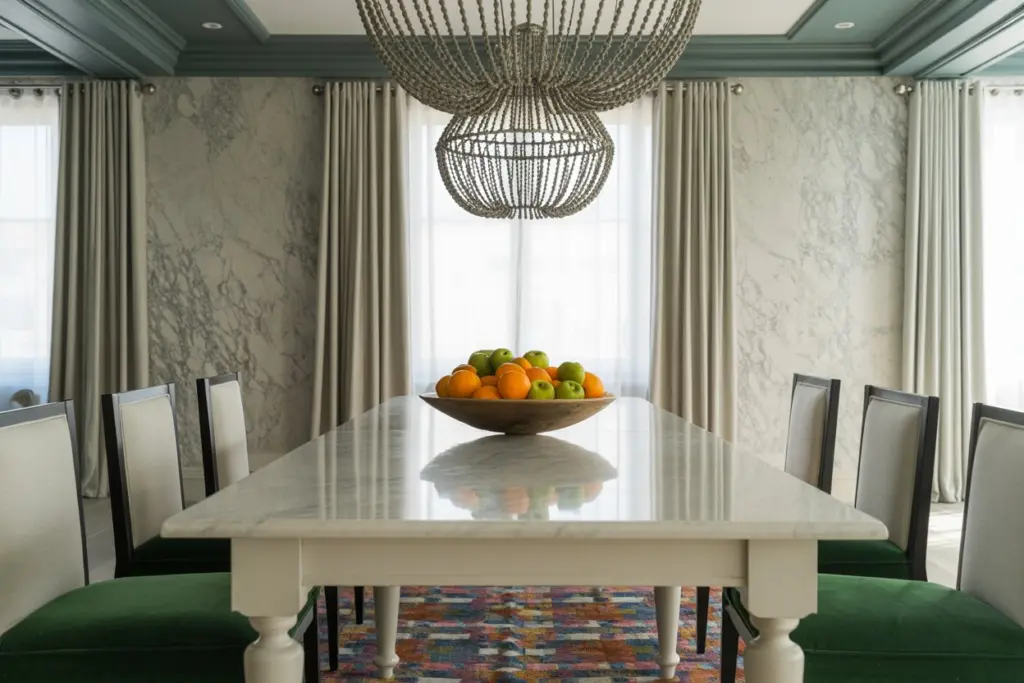
Setting the mood
Color has an emotional impact on our perception of space. A colored ceiling can help create the desired mood, whether it’s an energizing atmosphere with bright tones, or a feeling of calm and relaxation with soft, soothing colors.
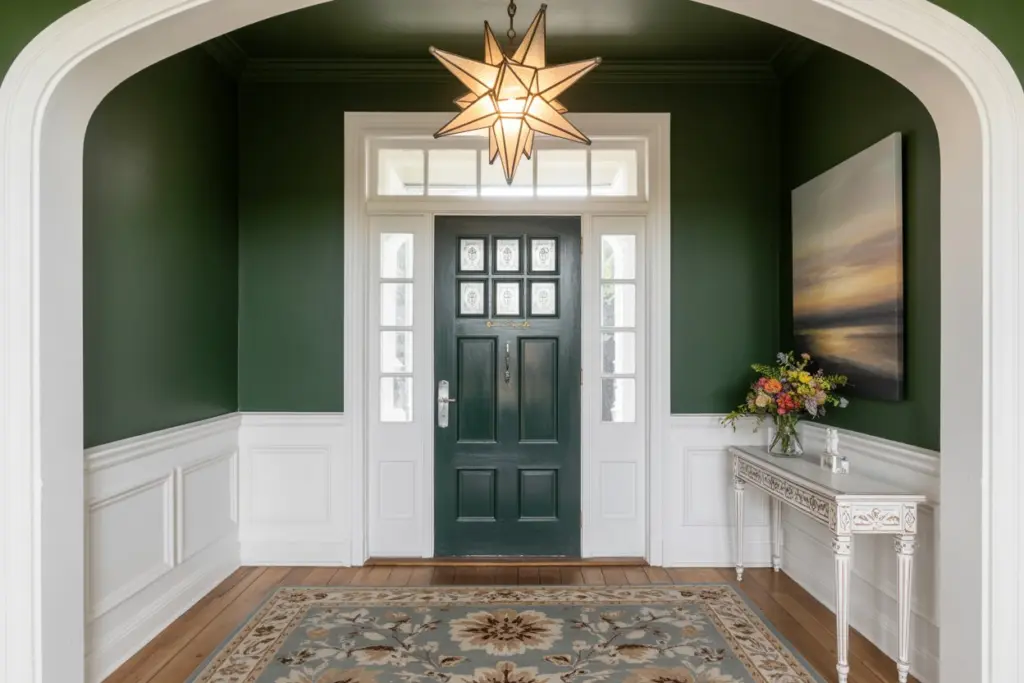
Possible for ceiling color
Black or dark gray ceiling color
In modern designs, these colors give a bold, exquisite impression. Rooms with high ceilings and plenty of natural light are ideal for them. Use them to draw attention to certain architectural features like beams or moldings.
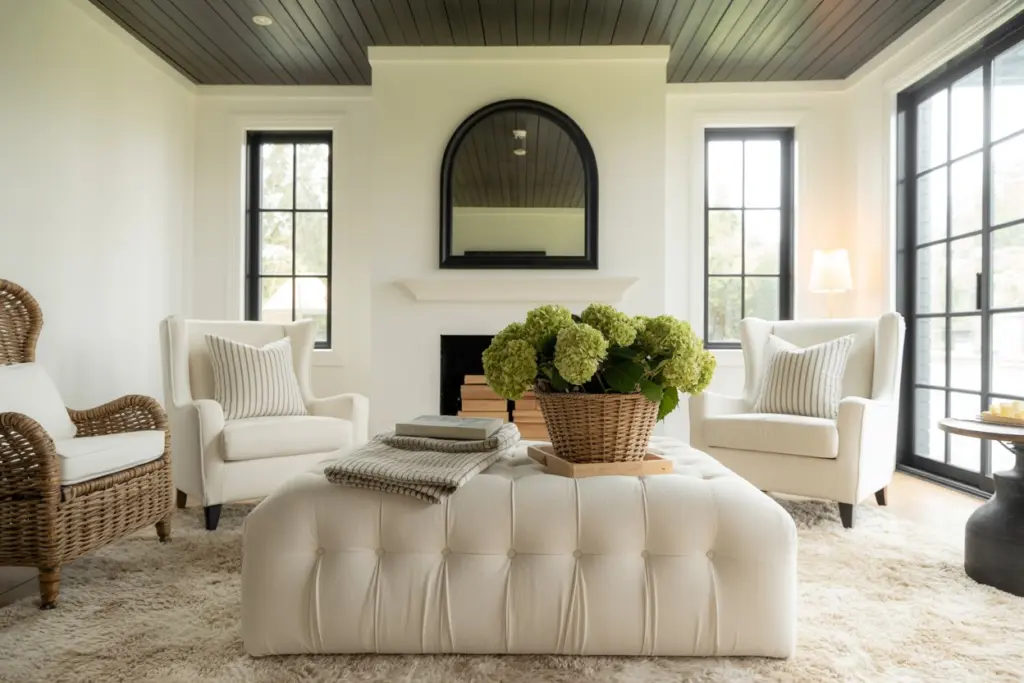
Midnight blue or deep green ceiling color
shades that provide a soothing, inclusive atmosphere. When you wish to create a cozy, soothing ambiance, they are perfect for bedrooms or relaxation spaces.
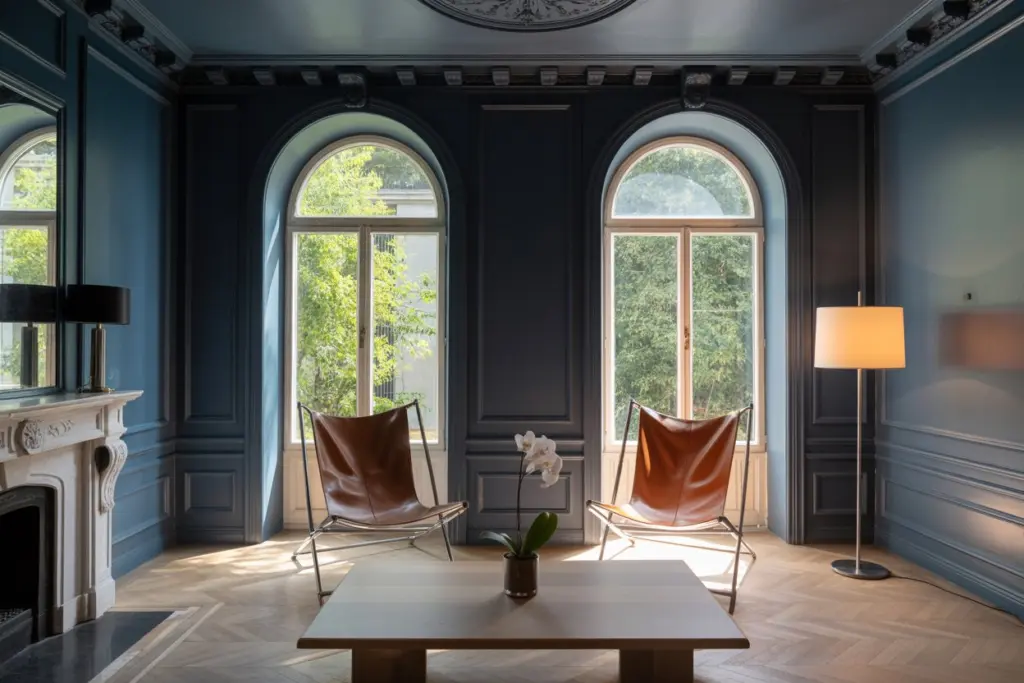
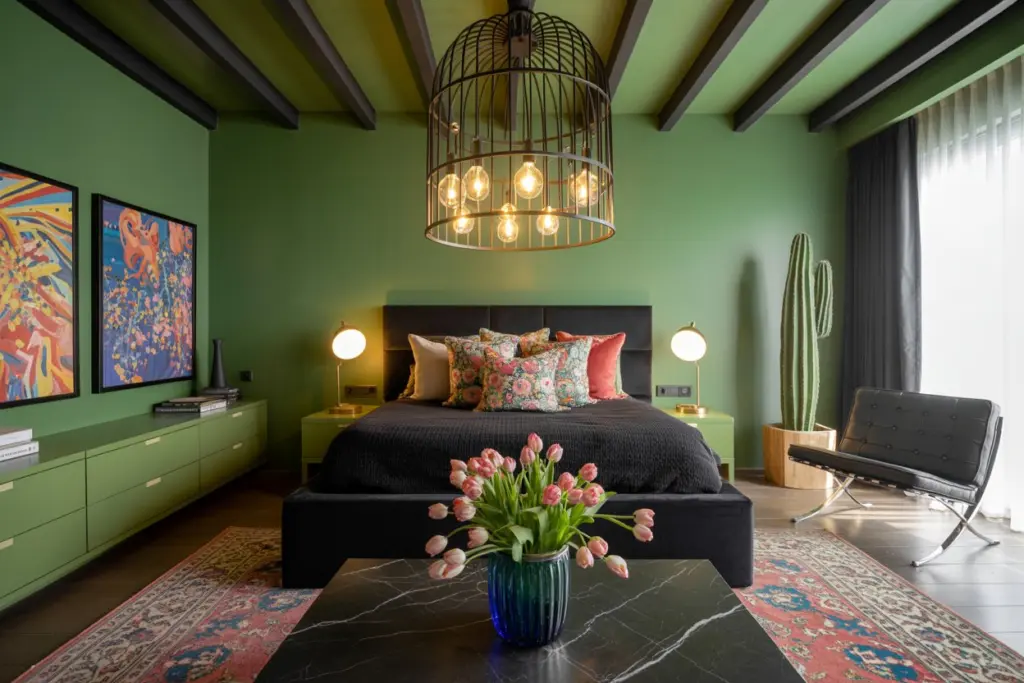
Rich earthy ceiling color
Shades like dark brown, terracotta or deep ochre add natural warmth to a room. They can be used in rustic or bohemian spaces to create a warm, welcoming atmosphere.
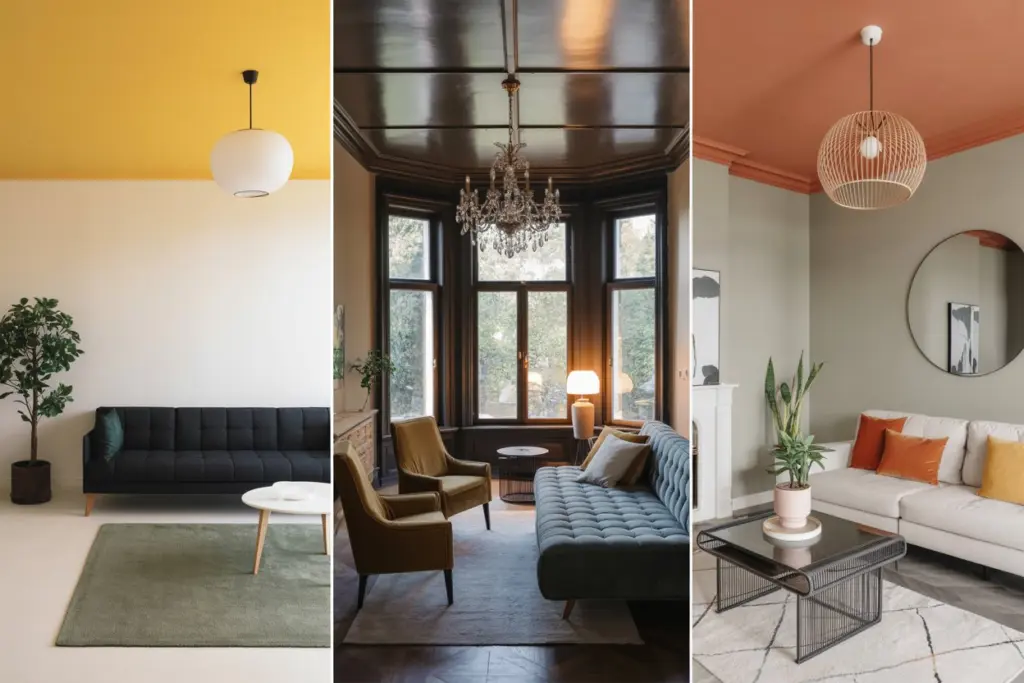
Classic white ceiling color
White is a versatile choice that works well in any room. It creates a clean, fresh and bright impression. Use it in small rooms or spaces with low ceilings to maximize the feeling of space.

Shades of light grey ceiling color
White is replaced by subtle, modern light greys. They add a subtle touch of sophistication and suit a wide variety of decorating styles.
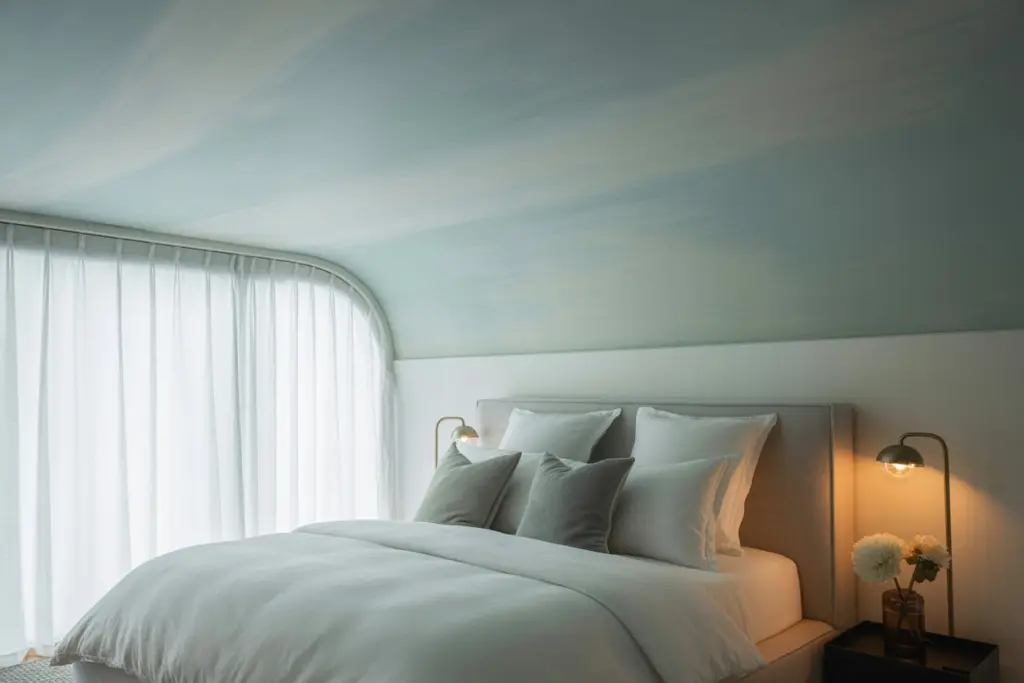
Pastel shades ceiling color
Pastel colors give a space a gentle, refreshing atmosphere. For instance, powder pink, soft blue, and delicate green. They are perfect for creating a gentle, peaceful ambiance in bedrooms for kids or in romantic settings.
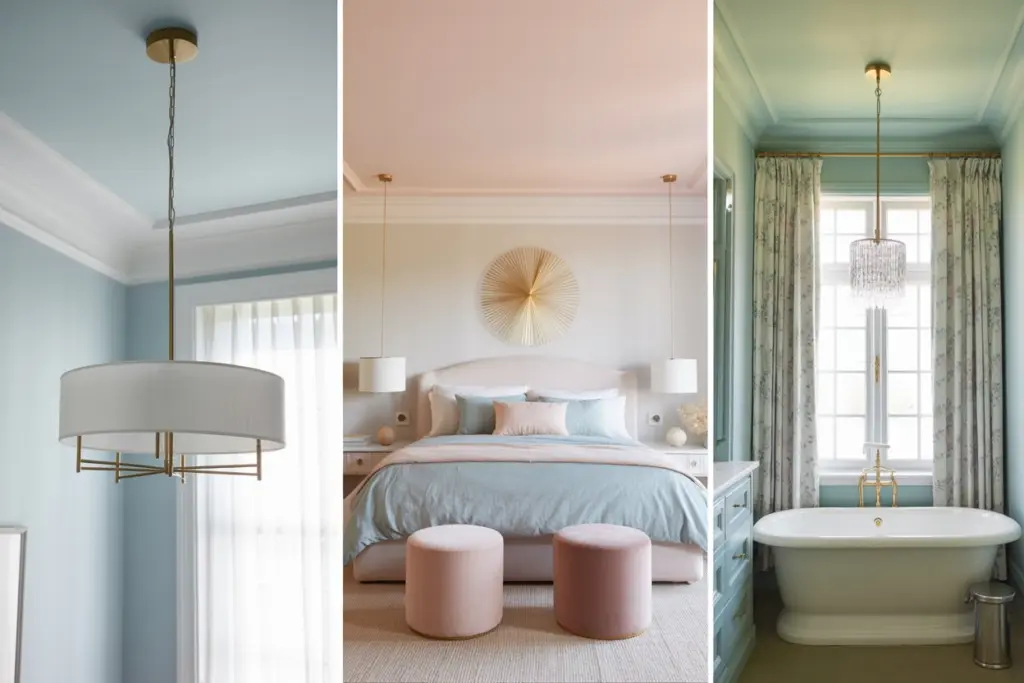
Dark ceiling color
A warm and inviting atmosphere may be added to a space by using dark colors on the ceiling for examples we have colors such as Black or dark gray , Midnight blue or deep green , Rich earthy colors. Here are some situations in which using dark shades may be appropriate:
Create an intimate ambience with the new ceiling color
In spaces such as bedrooms or living rooms, where an intimate atmosphere is desired, dark colors on the ceiling can help reduce the overall brightness of the room and create a more relaxed atmosphere.

Highlight architectural elements with the newceiling color
If you have interesting architectural details such as beams or moldings on the ceiling, using a dark color can help highlight them, creating a visual focal point.
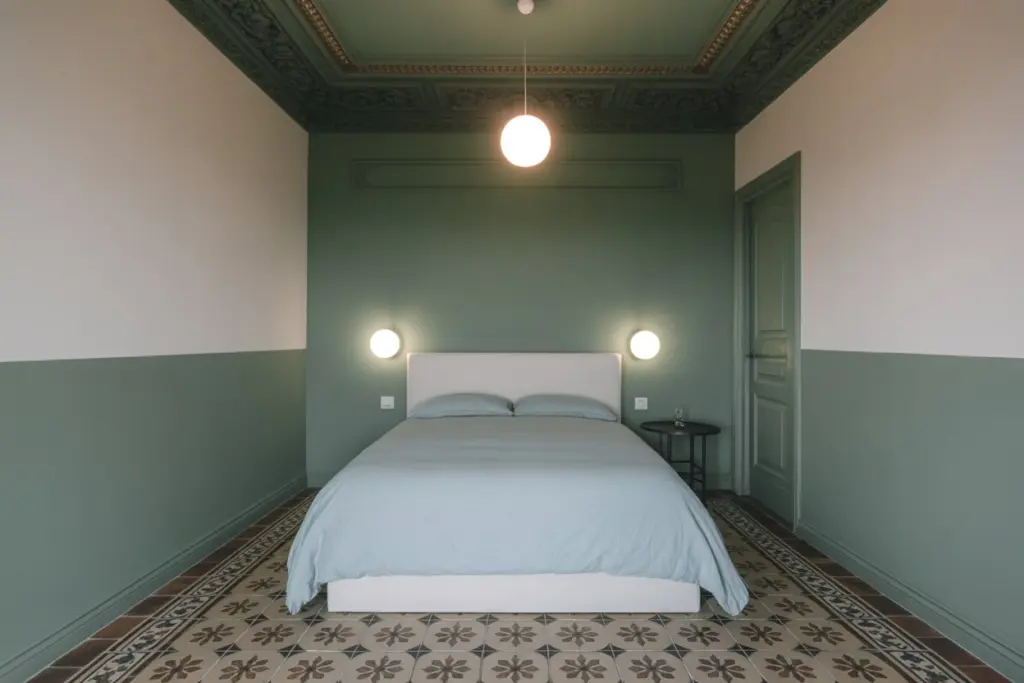
Masking imperfections
Ceilings with minor flaws such as cracks or irregularities can benefit from a dark color. Darker shades tend to absorb light and soften imperfections, giving the impression of a smoother surface.
Light ceiling color
Using light colors on the ceiling can help visually enlarge the space and create a bright atmosphere for examples we have colors such as Pastel shades, Classic White, Light Gray Shades. Here are a few situations in which the use of light shades may be preferable:
Ceiling color for Small rooms
In smaller spaces, using light colors on the ceiling can help create the illusion of space and make the room feel more airy and open.
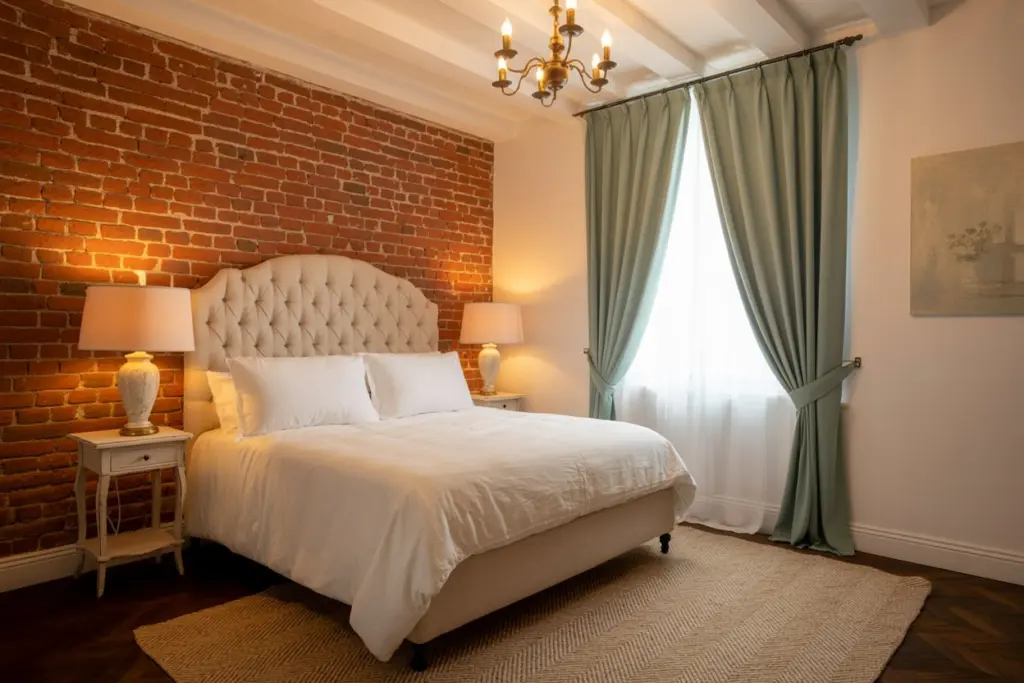
Ceiling colorforLow ceilings
If you have low ceilings, opting for a light color can give the illusion of greater height, creating a feeling of vertical space.
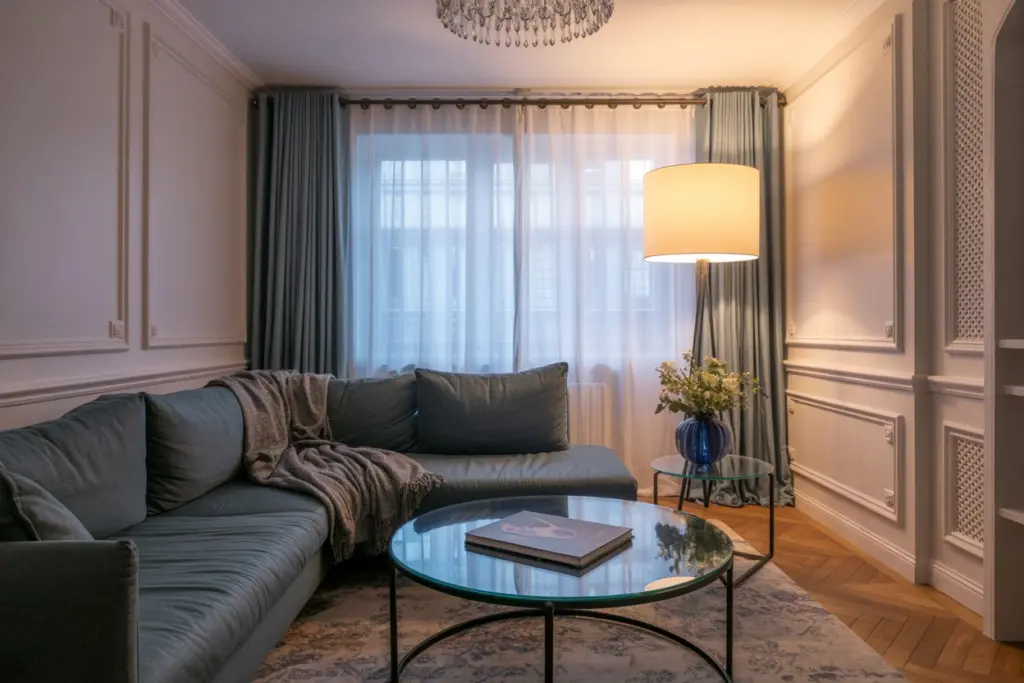
Maximize light
In rooms with limited natural light, light colors on the ceiling can help reflect light, making the room brighter and more welcoming.
In the case of using dark or light ceiling color, the walls will be
When using dark or light colors for the ceiling, it’s important to take into account the color of the walls to create a harmonious visual balance. Here are some considerations to bear in mind:
Contrast
If you opt for a dark ceiling, it may be preferable to have lighter walls to create a visual contrast. This will prevent the room from appearing too dark or confined. The lighter walls will help brighten the space and balance the dramatic effect of the dark ceiling.
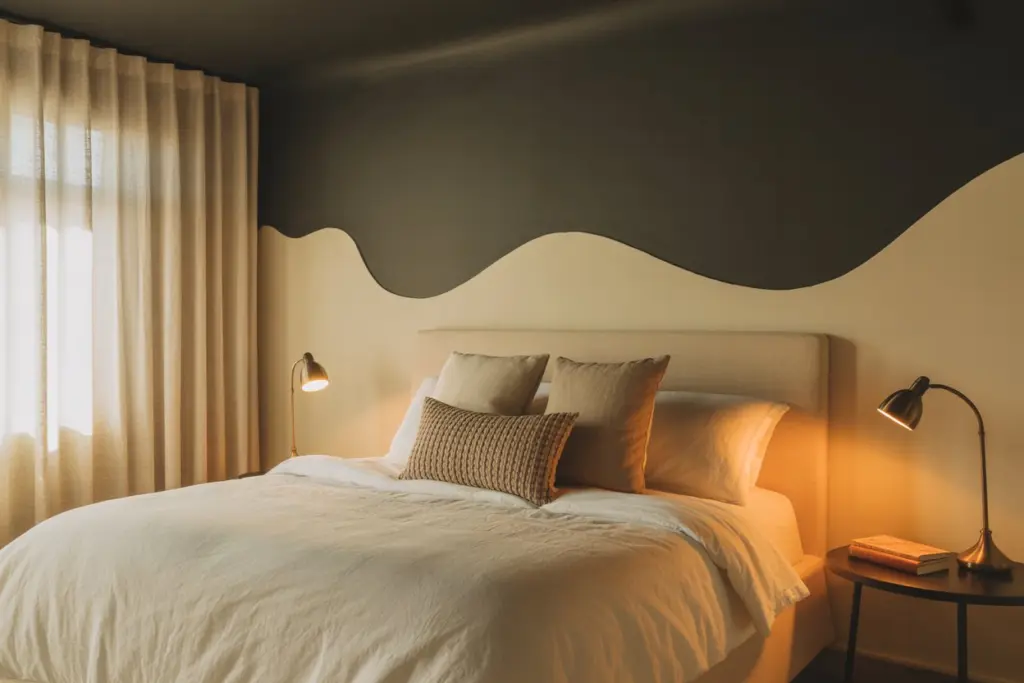
Harmony
For a more coherent and harmonious approach, you can choose walls in tones similar or complementary to the ceiling color. For example, if you have a dark blue ceiling, walls in lighter shades of blue or grey can create a harmonious, soothing ambience.
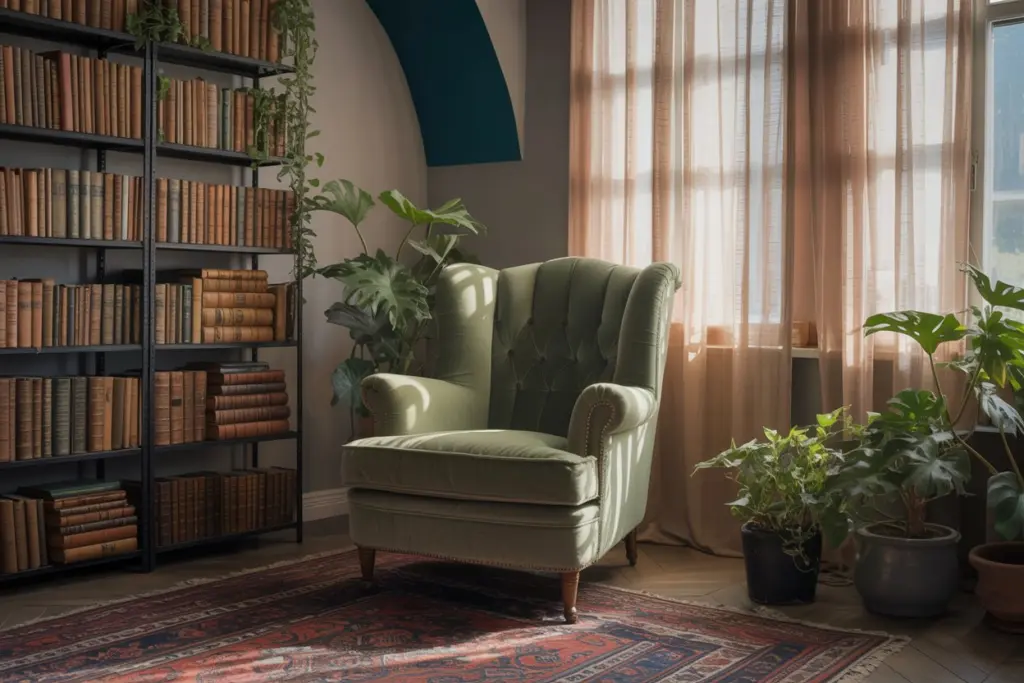
Subtle contrast
You can also create a subtle contrast by using slightly different shades for the walls and ceiling, but staying within the same color palette. For example, if you have a dark grey ceiling, you can opt for light grey walls or off-white shades to create a gentle transition while maintaining visual consistency.
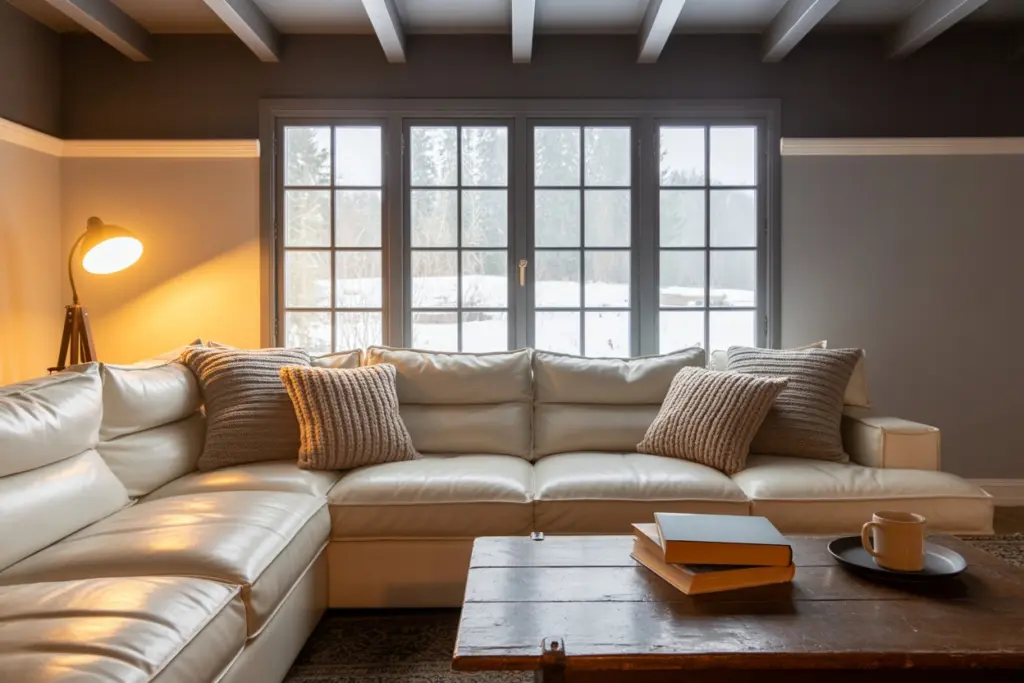
Open effect
If you want to create a feeling of openness and space, light walls with a light or slightly lighter ceiling can be effective. This will reflect light and give the room a feeling of amplitude.
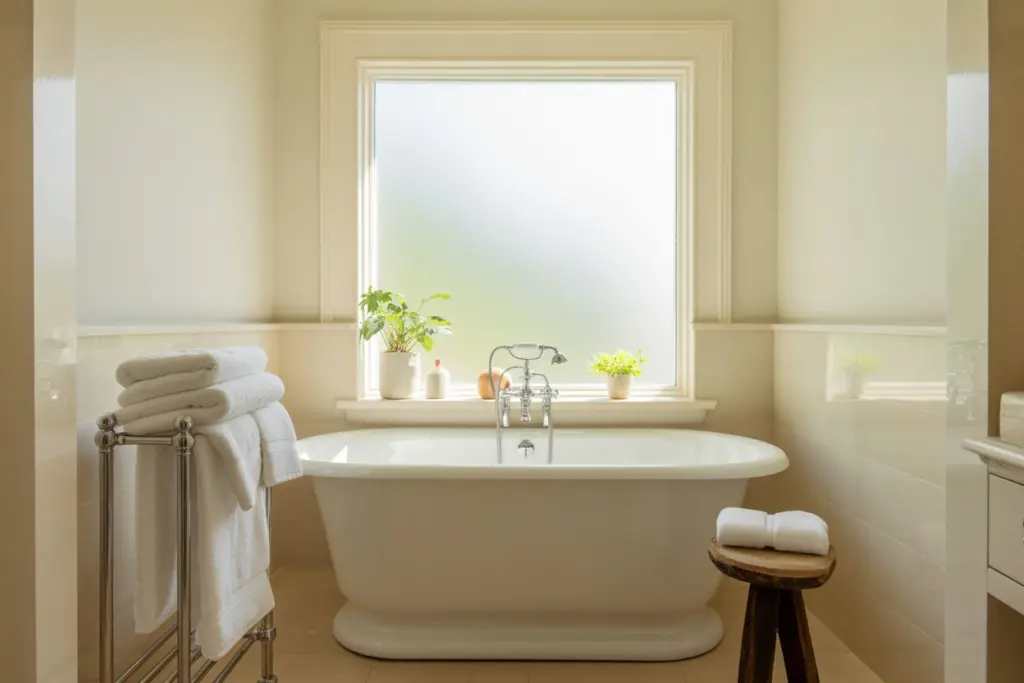
Reasons to dare the ceiling color
Does a ceiling have to be white all the time? The mature “fifth” is typically painted in a very light hue with a matt finish to make itself disappear out of habit and perhaps some conformism. also, to amplify the room’s sound. However, this presumption is not unchangeable! A colored ceiling visibly alters volumes and provides a unique, distinctive solution to several problems in architecture and interior design. These eleven ceilings serve as evidence.
To structure volumes
Applying a continuous color to a wall and ceiling structures the volumes of the room. Here, the contrast between the immaculate floor and back wall and the intense, luminous blue creates a cocoon effect in the living room. This choice of blue ceiling is amplified by the bay window, whose natural light enhances the effect.
To delimit the function of a zone in an open space
It’s essential to visually delimit the functions of each space occupied in an open-plan room. Here, the black ceiling marks the location of the kitchen in a spatial ensemble also comprising a living room and dining room. Black continues this logicon the walls. The dark color is warmed up by the parquet flooring and wooden structural elements in the kitchen.
To emphasize the architecture
The black-painted ceiling and beams add character and reinforce the impression of height. This effect is accentuated by the south-facing aspect of the room. The choice of black, a timeless color, ensures the durability of this interior design.
For fantasy and warmth
A soft, luminous hue on a ceiling lends personality to a room that doesn’t already have distinct decorative or architectural elements.
For fantasy and warmth
In this classic room, the choice of midnight blue on the ceiling serves a dual purpose: to rebalance the volumes (a very high ceiling gives a feeling of coldness) and to highlight the moldings. A fine balance between tradition and design.
How to dramatize a room
How do you add allure and uniqueness to a room? One option is to paint the ceiling in a bold color. Here, the chosen hue harmonizes with the wood and stone on the floor and wall.
Another example of theatricality, even more striking than the previous one, with this bright orange ceiling in a matte finish that accentuates the room’s vanishing lines. A radical, contemporary choice!
For a contemporary, designer look
A ceiling painted black modernizes any interior style. Be sure to paint the walls in a very light shade, to create balance and contrast.
To change the visual perception of a narrow room
Painting the floor, walls and ceiling the same color disrupts the perception of volume and reinforces the feeling of space. In this case, the soft green color brings freshness and luminosity.
Ceiling color choice and inspiration
Room size considerations
Darker colors may make a bigger room feel more personal, while lighter colors might aid in visually expanding a space. When selecting a ceiling color, it’s important to take the room’s size into account.
Coordinating with walls
The colored ceiling can harmonize with the walls using colors from the same family, or create a striking contrast with complementary shades. We’ll explore different color combinations to achieve the desired effect.
Inspiration from nature
Nature offers a rich palette of colors. We’ll look at how colors inspired by nature, such as earth tones, sky tones and plant hues, can bring a sense of calm and serenity to your space.
Practical applications
Traditional painting
The most common method of coloring a ceiling is to use paint. We’ll discuss best practices for preparing the surface, choosing the right tools and achieving an even, professional finish.
Special effects
In addition to plain paint, there are various techniques for adding character to your ceiling. We’ll explore options such as textured finishes, stencils, murals and custom murals.
Alternatives to paint
We’ll also look at alternatives to paint, such as fabric ceiling coverings, decorative panels, wallpapers and stretch ceilings, which offer varied and original color possibilities.
Practical advice and closing thoughts for ceiling color
Lighting and brightness
The impact of lighting and room brightness can be influenced by the color of the ceiling. We provide guidance on how to balance brightness while taking the color and lighting sources into consideration.
Stylistic consistency
It’s important to keep the design of the room consistent. In order to create a coherent overall, it is essential to take other visual elements like walls, flooring, and furniture into account.
Experiment and have fun
Finally, we invite readers to use their imagination and to enjoy themselves while selecting the hues for their ceiling. The intensity of color gives a chance to customize and liven up your area.
A colored ceiling is a daring and original approach to change the look of your room and give it a special touch. You may design a ceiling that inspires admiration and produces an amazing ambiance by carefully selecting color, combining with other decorative components, and investigating alternative application processes.
Dare to be imaginative, let your creativity soar, and let your ceiling transform into a complete piece of art in your room.
Essential Tips for Ceiling Painting Perfection
Although painting a ceiling may appear simple, perfecting and even finishing needs careful planning and execution. These suggestions can help you paint a ceiling with confidence and accuracy, whether you’re updating the current hue or attempting a whole new appearance.
Collect Your Materials
Make sure you have all the essential materials before you start:
- extension poles and paint rollers
- Liners and a paint tray
- Plaster tape
- plastic sheeting or drop cloths
- stepping stool
- Choose a premium interior ceiling paint while painting.
Make Room for It
To create a place that seems big and uncluttered, remove as much clutter as you can. To shield them from paint splatters, cover the furniture and floors with drop cloths or plastic sheeting.
Get the ceiling ready for you new ceiling color
- Make sure the ceiling is spotless and clear of debris, dust, and cobwebs. To clear any debris, use a vacuum or a duster.
- Use spackle or filler to fix any cracks, holes, or flaws. Once dried, sand the patched areas to achieve a smooth surface.
Put painter’s tape down
Use painter’s tape to cover any light fittings or ceiling fans that you can’t remove as well as the margins of the walls. To make clean lines and stop paint from flowing into the walls, gently apply the tape.
Prime, if Required
Applying a primer is a fantastic option if you’re drastically changing the color or if your ceiling has stains. This creates an equal foundation for the topcoat and aids in the appropriate adhesion of the fresh paint.
Begin by Cutting In
Cut in with a smaller brush around the walls, the edges of the ceiling, and the areas around the light fixtures. This establishes a barrier that makes using the roller on bigger areas simpler.
Select the Proper Roller
Use a roller with a nap (the texture of the roller) suited for the surface of your ceiling for a smooth finish. While textured ceilings benefit from a longer nap, smoother ceilings are better suited to a shorter sleep.
Put the paint on
To properly disperse the paint, dip the roller into the paint tray and roll it back and forth. Working in a “W” or “M” pattern, begin rolling the paint onto the ceiling in manageable areas. This aids in spreading the paint evenly and averts streaks.
Working effectively
Because painting a ceiling can be physically taxing, go slowly and take breaks as necessary. If you need to apply a second coat to your ceiling, wait until the first coat is fully dry before doing so.
Examine and Correct
Carefully take off the painter’s tape when the paint has dry. Look for any missing stains, drips, or uneven surfaces on the ceiling. To correct any flaws, use a little brush.
Dispose of
Follow the guidelines provided by the paint manufacturer while cleaning your brushes, rollers, and paint trays. Put away drop cloths and plastic sheeting, then place furniture back where it was.


